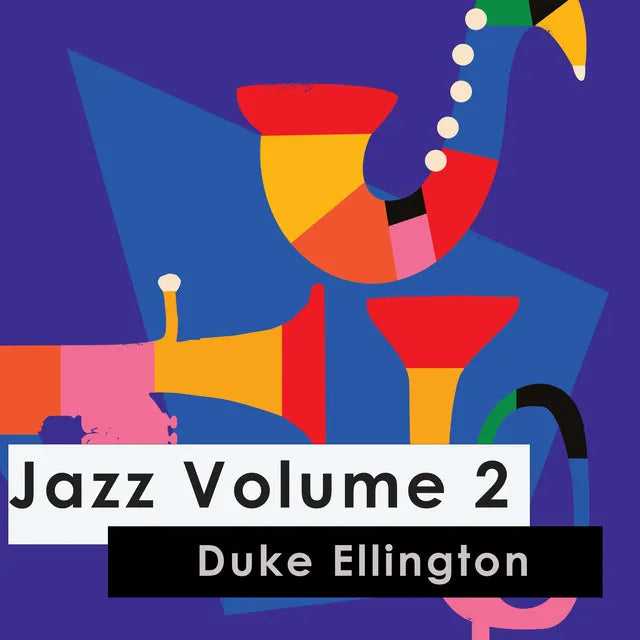


Duke Ellington Vinyl Records & Discography
Duke Ellington Biography
Who is Duke Ellington? A Brief Career Overview
Edward Kennedy "Duke" Ellington was not just a name; he was a revolutionary force in jazz music, a talented pianist, composer, and bandleader who captivated audiences for over 50 years! Born on April 29, 1899, in Washington, D.C., Ellington transformed the jazz genre, synonymous with sophistication and innovation. His unique style blended elements of swing, blues, and classical music, giving rise to some of the most enduring compositions in American music history.
With the ability to showcase the talents of his band members and write intricate arrangements, Ellington led his orchestra from the 1920s until his death in 1974, leaving behind a legacy that continues to inspire artists today. His recordings--many of which are cherished vinyl treasures--remain sought after by collectors and music aficionados alike. Ellington's music resonates on the needle of a record, making his contributions to the vinyl culture integral to the art of music appreciation.
Duke Ellington's Early Life and Background
Duke Ellington was born to a family with musical influences, which shaped his early appreciation for the arts. His parents, both musicians, instilled a strong sense of dignity and cultural pride in young Edward. Growing up in the vibrant environment of Washington, D.C., Ellington began piano lessons at just seven years old, an experience that ignited his passion for music. Although he dabbled in other interests, such as baseball, it was at the local poolrooms where his love for jazz flourished.
By his teenage years, he was writing music and developing his style, sneaking into clubs to absorb the sounds of local musicians. These experiences laid the groundwork for his future in music and his connection to vinyl records--a medium that would later carry his groundbreaking compositions to enthusiasts and collectors around the world.
The Musical Influences That Shaped Duke Ellington's Sound
Duke Ellington's signature sound was heavily influenced by a variety of artists and genres. He drew inspiration from ragtime pianists, stride players, and classical composers. Figures such as James P. Johnson and Fats Waller played significant roles in shaping his approach to music. Ellington's exposure to the musical landscape of his youth, filled with the work of black composers and the rhythms of the Harlem Renaissance, helped him carve out his unique voice in jazz.
Throughout his formative years, Ellington collected vinyl records from the artists he admired, many of whom became pivotal inspirations in his development as a composer. This connection between his influences and the vinyl medium demonstrates how deeply interconnected he was with the culture of music at the time--a relationship that continues to impact the music scene today.
How Duke Ellington Entered the Music Industry
Duke Ellington's journey into music was marked by determination and early success. Dropping out of high school, he formed 'The Duke's Serenaders,' a group that played at dances and private parties. His big break came in 1923 when he moved to New York City, where his band gained a residency at the Hollywood Club. This pivotal moment established him in the bustling jazz scene.
Ellington's first recordings were made under various pseudonyms, as he explored different sounds. His work during this time was a mix of creativity and struggle--he faced challenges related to distribution and recording on vinyl but persevered. His experimentation with genres and collaboration with fellow musicians allowed him to develop his iconic sound, setting the stage for future successes.
Duke Ellington's Breakthrough and Rise to Fame
Ellington's breakthrough came through a series of remarkable performances, most notably at the Cotton Club, which catapulted him into the national spotlight. His big-band sound--the "jungle style" marked by rich harmonies and dynamic rhythms--was a fresh take on jazz, with hits like "Mood Indigo" and "It Don't Mean a Thing (If It Ain't Got That Swing)" topping the charts. The impact of these vinyl releases was tremendous, endearing him to a wide audience and earning critical acclaim.
Over the years, Ellington received numerous awards, including Grammy Wins and prestigious honors, further solidifying his reputation. His ability to adapt and thrive amidst changing musical trends showcased not just his talent, but his lasting influence on generations of musicians.
How Personal Life Shaped Duke Ellington's Music
Ellington's personal experiences enriched his musical expressions. Relationships, loss, and struggles informed the themes of his compositions. His tumultuous romances and the challenges of being an African American artist during a time of segregation are echoed in the heartfelt narratives of his works. Ellington also engaged in philanthropy and social activism, supporting various causes throughout his life, and this commitment to social issues often influenced his artistic projects, including his famed "Sacred Concerts."
These personal dimensions of his life not only influenced the music he created but also made him a relatable figure, forging a connection with audiences who recognized the depth of emotion in his compositions.
Discography
Duke Ellington's Current Status and Legacy in the Music Industry
Even decades after his passing, Duke Ellington's influence in the music industry remains profound. His recent posthumous releases, like the highly anticipated "Copenhagen 1958", keep his legacy alive, appealing to both old fans and new listeners. Ellington has received numerous accolades posthumously, celebrating his undeniable impact on jazz and American music as a whole.
Younger generations of musicians continue to draw inspiration from Ellington's innovative styles, while collectors treasure his vinyl records as artifacts representing a rich musical heritage. As we reflect on Ellington's legacy, it's clear his work transcends time and genre, securing his title as one of the greatest composers in music history.
Shop the Store
Exclusive 15% Off for Teachers, Students, Military members, Healthcare professionals & First Responders - Get Verified!






























